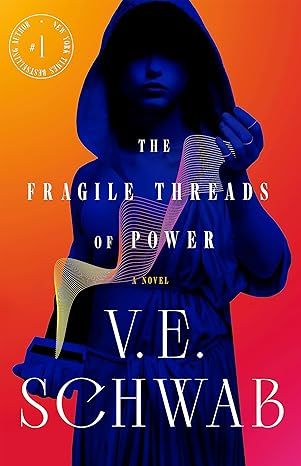The Fragile Threads of Power (Threads of Power, 1)
4.6
-
2,325 ratings
Now in paperback! This edition will feature French flaps and deckled edges.
- A New York Times Bestseller
- A USA Today Bestseller
- October IndieNext Pick
A new door opens...
Once there were four worlds, nestled like pages in a book, each pulsing with fantastical power and connected by a single city: London.
After a desperate attempt to prevent corruption and ruin in the four Londons, there are only three:
- Grey London, thriving but barely able to remember its magical heritage
- Red London, ruled lately by the Maresh family, flourishing and powerful
- White London, left to brutality and decay
Now the worlds are going to collide anew―brought to a dangerous precipice by the discoveries of three remarkable magicians.
There's Kosika, the child queen of White London, who has nourished her city on blood and dreams―and whose growing devotion to both is leading her down a dangerous path.
Then there's Delilah Bard, born a thief in Grey London, who crossed the worlds to become a legend far from there. She's an infamous magician, a devious heroine, and a risk-taking rogue, all rolled into one unforgettable package. Having disappeared to seek new adventure, an old favor now calls Lila back to a dangerous port, to join some old friends who need more help than they realize.
Last there is Tes, a young runaway with an unusual and powerful ability, hiding out in Red London while trying to stay out of the limelight.
Tes is the only one who can keep all the worlds from unraveling―if she manages to stay alive first.
From #1 New York Times bestselling author V. E. Schwab comes a new adventure set in a beloved world―where old friends and foes alike are faced with a dangerous new threat.
- PopSugar, This Year's Best New Fantasy
- Paste Magazine, Most Anticipated Fantasy Books of Fall
- The Washington Post, 10 Noteworthy Books for September
- Goodreads, Readers’ Most Anticipated Books of Fall
- Polygon, Best New SFF for the Fall
- EW.com, Fall Book Must-Reads
Read more
Kindle
$14.99
Available instantly
Audiobook
$0.00
with membership trial
Hardcover
$14.97
Paperback
$15.19
Ships from
Amazon.com
Payment
Secure transaction
ISBN-10
0765387506
ISBN-13
978-0765387509
Print length
672 pages
Language
English
Publisher
Tor Books
Publication date
September 16, 2024
Dimensions
5.38 x 1.25 x 8.25 inches
Item weight
1.24 pounds
Product details
ASIN :
B0BVK8GCGR
File size :
3532 KB
Text-to-speech :
Enabled
Screen reader :
Supported
Enhanced typesetting :
Enabled
X-Ray :
Enabled
Word wise :
Enabled
Editorial reviews
“Schwab's visceral, engrossing writing style delivers an unputdownable yarn once again."―EW.com
“A delightfully nostalgic addition to the world V.E. Schwab has created that still keeps things fresh with the introduction of new characters and the promise of more story to come.”―Polygon
“Wake up bestie, the first installment of a new fantasy series set in the world of V.E. Schwab’s A Darker Shade of Magic, is about to drop―and it’s one that longtime readers and new fans can both dive right into.” ―Paste Magazine
“Returning to the world of her fantastic A Darker Shade of Magic and its sequels, Schwab gives readers more of everything they love about that series: dynamic, unconventional characters; suspenseful plots; rich worldbuilding; and compelling relationships…Schwab’s pacing is confident, assured, and the book weaves a masterful spell on the reader. A delicious treat for fans of the Shades of Magic series and a lush, suspenseful fantasy in its own right.” ―Kirkus, starred review
“[Schwab] writes with a sense of authority and mischief...The Fragile Threads of Power will entrance and delight fantasy readers everywhere.” ―Booklist
“Schwab cleverly builds on her existing worlds, introducing new threats and expanding the magic system. The new characters captivate and the plot twists shock.” ―Publishers Weekly
“Schwab at her best. Be ready to fall in love all over again.”―Reactor.com
Praise for the Shades of Magic series “Schwab has given us a gem of a tale that is original in its premise and compelling in its execution. This is a book to treasure.” ―Deborah Harkness, New York Times bestselling author, on A Darker Shade of Magic
"Feels like a priceless object, brought from another, better world of fantasy books." ―io9 on A Darker Shade of Magic
“Compulsively readable...her characters make the book.” ―NPR on A Darker Shade of Magic
"This is how fantasy should be done.” ―Publishers Weekly, starred review, on A Gathering of Shadows
Praise for The Invisible Life of Addie LaRue “Schwab’s page-turner is an achingly poignant romantic fantasy about the desperate desire to make one’s mark on the world.” ―Oprah.com, Best LGBT Books of 2020
“One of the most propulsive, compulsive and captivating novels in recent memory.” ―Washington Post
Read more
Sample
For the ones who still believe in magic
Magic is the river that waters all things.
It lends itself to life, and in death calls it back,
and so the stream appears to rise and fall,
when in truth, it never loses a single drop.
—TIEREN SERENSE, ninth Aven Essen of the London Sanctuary
WHITE LONDON
SEVEN YEARS AGO
It came in handy, being small.
People talked of growing up like it was some grand accomplishment, but small bodies could slip through narrow gaps, and hide in tight corners, and get in and out of places other bodies wouldn’t fit.
Like a chimney.
Kosika shimmied down the last few feet and dropped into the hearth, sending up a plume of soot. She held her breath, half to keep from inhaling ash and half to make sure no one was home. Lark had said the place was empty, that no one had come or gone in more than a week, but Kosika figured it was better to be silent than sorry, so she stayed crouched in the fireplace a few moments, waiting, listening until she was sure she was alone.
Then she scooted onto the edge of the hearth and slipped off her boots, tying the laces and hanging them around her neck. She hopped down, bare feet kissing the wooden floor, and set off.
It was a nice house. The boards were even, and the walls were straight, and though the shutters were all latched, there were a lot of windows, and thin bits of light got in around the edges, giving her just enough to see by. She didn’t mind robbing nice houses, especially when people just up and left them unattended.
She went to the pantry first. She always did. People who lived in houses this nice didn’t think of things like jam and cheese and dried meat as precious, never got hungry enough to worry about running out.
But Kosika was always hungry.
Sadly, the pantry shelves were sparse. A sack of flour. A pouch of salt. A single jar of compote that turned out to be bitter orange (she hated bitter orange). But there, in the back, behind a tin of loose tea, she found a waxy paper bag of sugar cubes. More than a dozen of them, small and brown and shining like crystals. She’d always had a sweet tooth, and her mouth began to water even as she tucked one in her cheek. She knew she should only take one or two and leave the rest, but she broke her own rules and shoved the whole bag in her pocket, sucking on the cube as she went off in search of treasure.
The trick was not to take too much. People who had enough didn’t notice when one or two of their things went missing. They figured they’d simply misplaced them, put them down and forgotten where.
Maybe, she told herself, the person who’d lived here was dead. Or maybe they had simply gone on a trip. Maybe they were rich, rich enough to have a second home in the country, or a really big ship.
She tried to imagine what they were doing as she padded through the darkened rooms, opening cupboards and drawers, looking for the glint of coins, or metal, or magic.
Something twitched at the edge of her sight, and Kosika jumped, dropping into a crouch before she realized it was only a mirror. A large, silvered looking glass, propped on a table. Too big to steal, but still she drifted toward it, had to stand on her toes to see her face reflected back. Kosika didn’t know how old she was. Somewhere between six and seven. Closer to seven, she guessed, because the days were just starting to get shorter, and she knew she was born right at the point where summer gave way to fall. Her mother said that was why she looked like she was caught between, neither here nor there. Her hair, which was neither blond nor brown. Her eyes, which were neither green nor grey nor blue.
(Kosika didn’t see why a person’s looks even mattered. They weren’t like coin. They didn’t spend.)
Her gaze dipped. Below the mirror, on the table, there was a drawer. It didn’t have a knob or a handle, but she could see the groove of one thing set into another, and when she pressed against the wood, it gave, a hidden clasp released. The drawer sprang out, revealing a shallow tray, and two amulets, made of glass or pale stone, one bound in leather and the other in thin strands of copper.
Amplifiers.
She couldn’t read the symbols scratched into the edges, but she knew that’s what they were. Talismans designed to capture power, and bind it to you.
Most people couldn’t afford magic-catchers—they just carved the spells straight into their skin. But marks faded, and skin sagged, and spells turned with time, like rotten fruit, while a piece of jewelry could be taken off, exchanged, refilled.
Kosika lifted one of the amulets, and wondered if the amplifiers were worth less, or even more, now that the world was waking up. That’s what people called the change. As if the magic had just been sleeping all these years, and the latest king, Holland, had somehow shaken it awake.
She hadn’t seen him yet, now with her own eyes, but she’d seen the old ones, once, the pale twins who rode through the streets, their mouths stained dark with other people’s blood. She’d felt only a pang of relief when she heard they were dead, and if she was honest, she hadn’t cared much at first about the new king, either. But it turned out Holland was different. Right after he took the throne, the river began to thaw, and the fog began to thin, and everything in the city got a little brighter, a little warmer. And all at once, the magic began to flow again. Not much of it, sure, but it was there, and people didn’t even have to bind it to their bodies using scars or spellwork.
Her best friend, Lark, woke up one morning with his palms prickling, the way skin did sometimes after it went numb, and you had to rub the feeling back. A few days later, he had a fever, sweat shining on his face, and it scared Kosika to see him so sick. She tried to swallow up the fear, but it made her stomach hurt, and all night she lay awake, convinced that he would die and she’d be even more alone. But then, the next day, there he was, looking fine. He ran toward her, pulled her into an alley, and held out his hands, cupped together like he had a secret inside. And when he opened his fingers, Kosika gasped.
There, floating in his palms, was a small blue flame.
And Lark wasn’t the only one. Over the last few months, the magic had sprouted up like weeds. Only it never really grew inside the grown-ups—at least, not in the ones who wanted it most. Maybe they’d spent too long trying to force magic to do what they wanted, and it was angry.
Kosika didn’t care if it skipped them, so long as it found her.
It hadn’t, not yet.
She told herself that was okay. It had only been a few months since the new king took the throne and brought the magic with him. But every day, she checked her body, hoping to find some hint of change, studied her hands and waited for a spark.
Now Kosika shoved the amplifiers in her pocket with the sugar cubes, and slid the secret drawer shut, and headed for the front door. Her hand was just reaching for the lock when the light caught on the wooden threshold and she jerked to a stop. It was spelled. She couldn’t read the marks, but Lark had taught her what to look for. She looked balefully back at the chimney—it was a lot harder going up than down. But that’s exactly what she did, climbing into the hearth, and shoving her boots back on, and shimmying up. By the time Kosika got back onto the roof, she was breathless, and soot-stained, and she popped another sugar cube into her mouth as a reward.
She crept to the edge of the roof and peered down, spotting Lark’s silver-blond head below, hand outstretched as he pretended to sell charms to anyone who passed, even though the charms were just stones painted with fake spells and he was really standing there to make sure no one came home while she was still inside.
Kosika whistled, and he looked up, head cocked in question. She made an X with her arms, the sign for a spell she couldn’t cross, and he jerked his head toward the corner, and she liked that they had a language that didn’t need words.
She went to the other side of the roof and lowered herself down the gutter, dropping to a crouch on the paving stones below. She straightened and looked around, but Lark wasn’t there. Kosika frowned, and started down the alley.
A pair of hands shot out and grabbed her, hauling her into the gap between houses. She thrashed, was about to bite one of the hands when it shoved her away.
“Kings, Kosika,” said Lark, shaking his fingers. “Are you a girl or a beast?”
“Whichever one I need to be,” she shot back. But he was smiling. Lark had a wonderful smile, the kind that took over his whole face and made you want to smile, too. He was eleven, gangly in that way boys got when they were growing, and even though his hair was as pale as the Sijlt before it thawed, his eyes were warm and dark, the color of wet earth.
He reached out and patted the soot off her clothes. “Find anything good?”
Kosika took out the amplifiers. He turned them over in his hands, and she knew he could read the spells, knew they were a good find by the way he studied them, nodding to himself.
She didn’t tell Lark about the sugar, and she felt a little bad about it, but she told herself he didn’t like sweet things, not as much as she did, and it was her reward for doing the hard work, the kind that got you caught. And if she’d learned anything from her mother, it was that you had to look out for yourself.
Her mother, who had always treated her like a burden, a small thief squatting in her house, eating her food and sleeping in her bed and stealing her heat. And for a long time, Kosika would have given anything to be noticed, to feel wanted, by someone else. But then children started waking up with fire in their hands, or wind beneath their feet, or water tipping toward them like they were downhill, and Kosika’s mother started noticing her, studying her, a hunger in her eyes. These days, she did her best to stay out of the way.
Lark pocketed the amulets—she knew whatever he got for them, he’d give her half, he always did. They were a team. He ruffled her in-between hair, and she pretended not to like the way it felt, the weight of his hand on her head. She didn’t have a big brother, but he made her feel like she did. And then he gave her a gentle push, and they broke apart, Lark toward wherever it was he went, and Kosika toward home.
She slowed as the house came into sight.
It was small and thin, like a book on a shelf, squeezed between two others on a road barely large enough for a cart, let alone a carriage. But there was a carriage parked in front, and a short man standing by the front door. The stranger wasn’t knocking, just standing there, smoking a taper, thin white smoke pluming around his head. His skin was covered in tattoos, the kind the grown-ups used to bind magic to them. He had even more than her mother. The marks ran over his hands and up his arms, disappearing under his shirt and reappearing at his throat. She wondered if that meant he was strong, or weak.
As if the man could feel her thinking, his head swiveled toward her, and Kosika darted back into the shadow of the nearest alley. She went around to the back of the house, climbed the crates beneath the window. She slid the frame up, even though it was stiff and she’d always had a fear that it would swing back down and cut her head right off as she was climbing through. But it didn’t, and she shimmied over the sill, and dropped to the floor, holding her breath.
She heard voices in the kitchen.
One was her mother’s, but she didn’t recognize the other. There was a sound, too. The clink clink clink of metal. Kosika crept down the hall, and peered around the doorway, and saw her mother and another man sitting at the table. Kosika’s mother looked like she always did—tired and thin, like a piece of dried fruit, all the softness sucked away.
But the man, she’d never seen before. He was stringy, like gristle, his hair tied back off his face. A black tattoo that looked like knots of rope traced the bones on his left hand, which hovered over a stack of coins.
He lifted a few and let them fall, one by one, back onto the stack. That was the sound she’d heard.
Clink clink clink.
Clink clink clink.
Clink clink clink.
“Kosika.”
She jumped, startled by her mother’s voice, and by the kindness in it.
“Come here,” said her mother, holding out her hand. Black brands ringed each of her fingers and circled her wrist, and Kosika resisted the urge to back away, because she didn’t want to make her mother mad. She took a cautious step forward, and her mother smiled, and Kosika should have known then, to stop out of reach, but she took another slow step toward the table.
“Don’t be rude,” snapped her mother, and there, at least, was the tone she knew. “Her magic hasn’t come in yet,” her mother added, addressing the man, “but it will. She’s a strong girl.”
Kosika smiled at that. Her mother didn’t often say nice things.
The man smiled, too. And then he jerked forward. Not with his whole body, just his tattooed hand. One second it was there on the coins and the next it was around her wrist, pulling her close. Kosika stumbled, but he didn’t let go. He twisted her palm up, exposing the underside of her forearm, and the blue veins at her wrist.
“Hmm,” he said. “Awfully pale.”
His voice was wrong, like rocks were stuck inside his throat, and his hand felt like a shackle, heavy and cold around her wrist. She tried to twist free, but his fingers only tightened.
“She does have some fight,” he said, and panic rose in Kosika, because her mother was just sitting there, watching. Only she wasn’t watching her. Her eyes were on the coins, and Kosika didn’t want to be there anymore. Because she knew who this man was.
Or at least, what he was.
Lark had warned her about men and women like him. Collectors who traded not in objects, but in people, anyone with a bit of magic in their veins.
Kosika wished she had magic, so she could light the man on fire, scare him away, make him let go. She didn’t have any power, but she did at least remember what Lark told her, about where to hit a man to make him hurt, so she wrenched backward with all her weight, forcing the stranger to his feet, and then she kicked him, hard, as hard as she could, right between his legs. The man made a sound like a bellows, all the air whooshing out, and the hand around her wrist let go as he crashed into the table, toppling the stack of coins as she shot toward the door.
Her mother tried to grab her as she passed, but her limbs were too slow, her body worn out from all those years of stealing magic, and Kosika was out the door before she remembered the other man, and the carriage. He came at her in a wreath of smoke, but she ducked beneath the circle of his arms, and took off down the narrow road.
Kosika didn’t know what they’d do if they caught her.
It didn’t matter.
She wouldn’t let them.
They were big but she was fast, and even if they knew the streets, she knew the alleys and the steps and all nine walls and the narrow gaps in the world—the ones that even Lark couldn’t fit through anymore. Her legs started to hurt and her lungs were burning, but Kosika kept running, cutting between market stalls and shops until the buildings staggered and the path climbed into steps and gave way onto the Silver Wood.
And even then, she didn’t stop.
None of the other children would go into the wood. They said it was dead, said it was haunted, said there were faces in the trees, eyes watching from the peeling grey bark. But Kosika wasn’t scared, or at least, not as scared of the dead forest as she was of those men, with their hungry eyes and shackle hands. She crossed the first line of trees, straight as bars on a cage, and kept going one row, two, three, before pressing herself back against a narrow trunk.
She closed her eyes, and held her breath, and tried to listen past the hammer of her heart. Listen for voices. Listen for footsteps. But the world was suddenly quiet, and all she heard was the murmur of wind through the mostly bare branches. The rustle of it on brittle leaves.
Slowly, she opened her eyes. A dozen wooden eyes stared back from the trees ahead. She waited for one of them to blink, but none of them did.
Kosika could have turned back then, but she didn’t. She’d crossed the edge of the woods, and it had made her bold. So she went deeper, walking until she couldn’t see the rooftops, or the streets, or the castle anymore, until it felt like she wasn’t in the city at all, but somewhere else. Somewhere calm. Somewhere quiet.
And then she saw him.
The man was sitting on the ground, his back against a tree, his legs out and his chin dropped against his chest, limp as a rag doll, but the sight of him still made her gasp, the sound loud as a snapping stick in the silent woods. She clapped a hand over her mouth and ducked behind the nearest tree, expecting the man’s head to jerk up, his hand to reach for a weapon. But he didn’t move. He must have been asleep.
Kosika chewed her lip.
She couldn’t leave—it wasn’t safe to go home, not yet—and she didn’t want to put her back to the man on the ground, in case he tried to surprise her, so she sank down against another tree, legs crossed, making sure she could see the sleeping stranger. She dug in her pockets, came up with the waxy bag of sugar.
She sucked on the cubes one at a time, eyes darting now and then to the man against the tree. She decided to save one of the sugar cubes for him, as thanks for keeping her company, but an hour passed, and the sun sank low enough to scrape the branches, and the air went from cool to cold, and the man still didn’t move.
She had a bad feeling, then.
“Os?” she called out, wincing as the sound of her voice broke the silence of the Silver Wood, the word bouncing off the hard trees.
Hello? Hello? Hello?
Kosika got to her feet and made her way toward the man. He didn’t look very old, but his hair was silver white, his clothes finely made, too nice to be sitting on the ground. He wore a silver half-cloak, and she knew, as soon as she got close enough, that he wasn’t sleeping.
He was dead.
Kosika had seen a dead body before, but it had been much different, limbs askew and insides spilled out onto the cobblestones. There was no blood on the man beneath the tree. He looked like he’d just gotten tired, and decided to sit down and rest, and never managed to get back up. One arm was draped in his lap. The other hung at his side. Kosika’s gaze followed it down to his hand where it touched the ground. There was something beneath his fingers.
She leaned closer, and saw that it was grass.
Not the hard, brittle blades that coated the rest of the Silver Wood, but soft, new shoots, small and green and spreading out beneath him like a cushion.
She ran her fingers over it, recoiling when her hand accidentally grazed his skin. The man was cold. Her eyes went to his half-cloak. It looked nice, and warm, and she thought of taking it, but she couldn’t bring herself to touch him again. And yet, she didn’t want to leave him, either. She took the last of the sugar cubes from the waxy bag and set it in his palm, just as a sound shattered the quiet.
The scrape of metal and the thud of boots.
Kosika leapt up, darting into the trees for cover. But they weren’t coming after her. She heard the steps slow, then stop, and she stopped, too, peering around a narrow trunk. From there, she couldn’t see the man on the ground, but she saw the soldiers standing over him. There were three of them, their silver armor glinting in the thin light. Royal guards.
Kosika couldn’t hear what they were saying, but she saw one kneel, heard another let out a ragged sob. A sound that splintered the woods, and made her wince, and turn her back, and run.
Read more
About the authors
V. E. Schwab
VICTORIA “V. E.” SCHWAB is the #1 New York Times bestselling author of more than twenty books, including the acclaimed Shades of Magic series, the Villains series, the Cassidy Blake series and the international bestseller The Invisible Life of Addie LaRue. Her work has received critical acclaim, translated into over two dozen languages, and optioned for television and film. First Kill – a YA vampire series based on Schwab’s short story of the same name – is currently in the works at Netflix with Emma Roberts’ Belletrist Productions producing. When she's not haunting Paris streets or trudging up English hillsides, she lives in Edinburgh, Scotland, and is usually tucked in the corner of a coffee shop, dreaming up monsters.
Read more
Reviews
Customer reviews
4.6 out of 5
2,325 global ratings
Robin Snyder
5
Fantastic Continuation to the Original Series set Sever Years Later with a Few New Players.
Reviewed in the United States on February 11, 2024
Verified Purchase
V.E. Schwab has brought us back to the fantastic world she created in Shades of Magic . To really enjoy this new spin-off series I highly recommend immersing yourself in the original trilogy. It has been seven years since the events of the original trilogy and the main characters from that are still very present, with some new players to the game.
Kell and Lila have been sailing around the world having adventures and learning to live with the consequences Kell faced at the end of Shades of Magic. They have built a life together but Lila has not lost that stubborn streak to try and remain wholly independent and not need anyone.
“Why didn’t you stay on the ship?” he asked again, because now and then, it was not enough to dance around the truth. He wanted to hear her say it. Even if she did not wear the ring. He wanted to know that she chose to be here, with him. Lila held his gaze so long he could have counted the shards of light in her good eye. And then, at last, almost grudgingly, she said, “Because the bed would feel empty. Without you in it.”
Rys is stuck so to speak in London ruling with Alucard, who is known as the Kings Heart. He has a new Queen and daughter to bring into the mix. The structure of the relationships between all three are very interesting to say the least. Both Alucard and the Queen are determined to save Rys, not only from himself but from the new plot by a group called the Hand, who wants to remove him from power by any means necessary.
In White London there is a new Queen. In Holland's absence Kosika is taken over is in charge of that London. She is doing everything possible to revive the lands there. underestimated because she is a young child coming into her power at the age of 8, she is now 15 and proving to be a very adept ruler. However the walls might be thinning between here London and Black London. What are the risks and can they be held at bay. She has a strange advisor, but I haven't decided if he is helping or subtly subverting our little Kosika.
Tes, well she was one of the most interesting stories in the book. After running away from her family she has set up a shop to fix broken things. Her magic is really special, she can see the threads of magic. She can hold them in her hands and fix or change magical items to be even better. She has mostly tried to stay under the radar hiding from her family but when something appears in her shop to be fixed, she fixes it better than it was supposed to be creating something that can open a door between worlds. She is now embroiled in this magical war and the machinations of The Hand. She needs to find one of the Antari to help her. But as we know Lila isn't exactly warm and welcoming and there will be people in the palace that want to use her for their own gains.
“As far as she was concerned, family had nothing to do with proximity or blood. Family was a chosen thing. A label earned.”
I really enjoyed so much of this story. It was great to see all the characters that I loved in the original series and see what they were up to and how their lives were going. Lila is infuriating sometimes but she and Kell really fit together and I love their love story.
“To Lila, Kell had always been a pane of glass tilted toward her just so, so that where others saw only colors and streaks, she saw the truth of it. Of him.”
The new Queen was an interesting and morally ambiguous character. She chose to marry Rys for her own reasons, those of power and autonomy but sometimes she seems to be the most dangerous of all of the characters in the book. She is absolutely brilliant but also the creations she makes in the wrong hands could be beyond deadly.
This story had so many great facets. Told in both past and future we learn what the characters have been up to in the seven years since the events to drive out the black taint. We also get to see some glimpses for the bad guys PoV, even if not all of the names of those characters are revealed. There are multiple plots afoot to kill Rys, which as we know if impossible, well unless you kill Kell I suppose but that isn't common knowledge and I think Lila would have something to say to anyone who tried.
I'm really excited to see what happens when Kosika possible starts to interact with the characters in Kell's London and how the thinning of the doors will affect all of the magic in the worlds. Maybe Lila's home will finally get a little magic on that side as we see there is some hope for it when we visit there.
Overall, I couldn't put this book down I was so invested in the characters, the story, the political intrigue and character development. I found everything so interesting but if you weren't invested in the first series I think it could seem a little long and some of the concepts of the story might be a little confusing. Still if you read the first series this is like coming home after being away for a few years and catching up with all your old friends.
Narration:
I believe it was so smart to do multiple narrators on this. If you have read anything in the epic fantasy realm then you should already be familiar with Kate Reading and Michael Kramer. They are really fantastic at narrating and I always know they will deliver a solid performance. No matter how big the cast they have been able to accommodate large sets of characters into their Narrations. Marisa Calin isn't a novice narrator with over 100 titles under her belt, but I've only listened to one other book she has narrated. I think the biggest compliment I can give her is that I didn't notice differences between the caliber or her chapters or those of Kate Reading and Michael Cramer. She held her own with two powerhouses of narration and that is a huge compliment.
I listened to the story at my usual 1.5x speed.
Read more
8 people found this helpful
Sarah W.
5
Expect a book hangover after reading
Reviewed in the United States on July 18, 2024
Verified Purchase
I love this world. I love these characters, who are all flawed and lovely in their own ways. I found myself loving (or at least invested in) the new characters that were introduced in Threads. I love Schwab’s lyrical and precise prose (although there were a few typos in the Kindle edition). I found myself stalling in the final pages, not wanting it to be over. And now it is and I’m sad I have to wait for the next installment.
Read more
Elizabeth Toller
5
When a trilogy deserves to continue
Reviewed in the United States on July 11, 2024
Verified Purchase
This was an excellent fourth book, with the addition of new characters to love and resolving threads left over by the original trilogy. While you could start here, don’t!
Top V. E. Schwab titles
View all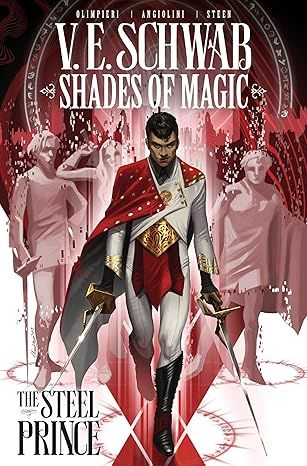
Shades Of Magic: The Steel Prince Vol. 1 (Graphic Novel)
4.1
-
468
$16.99
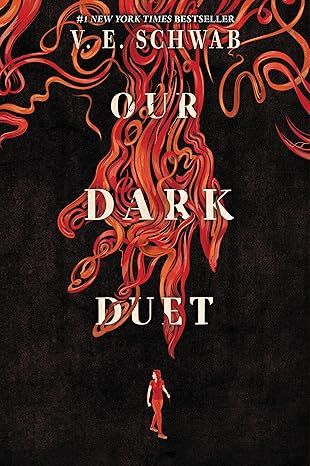
Our Dark Duet (Monsters of Verity, 2)
4.5
-
1,676
$10.43
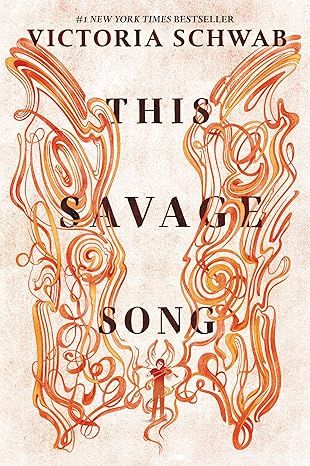
This Savage Song (Monsters of Verity, 1)
4.3
-
4,179
$2.08
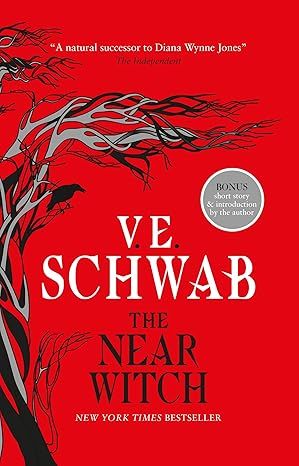
The Near Witch
4.3
-
2,183
$11.69
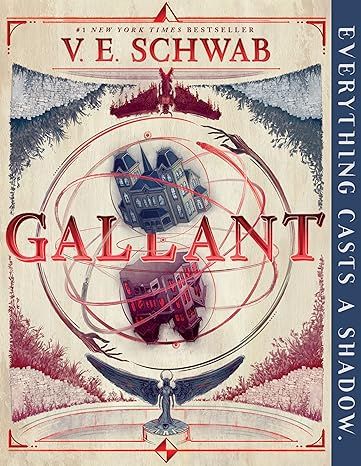
Gallant
4.2
-
4,163
$9.51
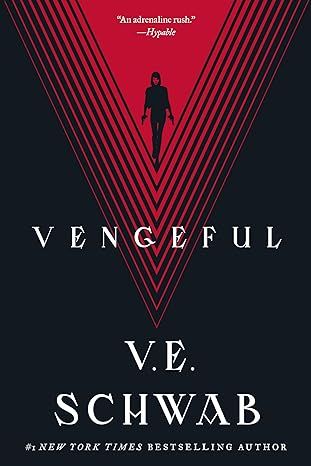
Vengeful (Villains, 2)
4.4
-
5,141
$9.73
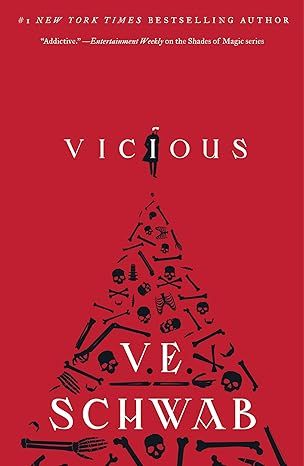
Vicious (Villains, 1)
4.3
-
15,391
$10.99
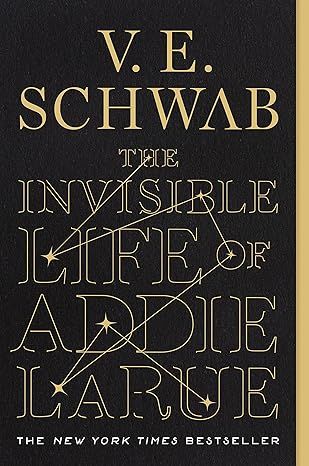
The Invisible Life of Addie LaRue
4.5
-
88,565
$12.59
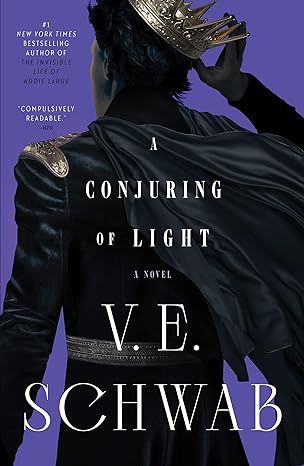
A Conjuring of Light: A Novel (Shades of Magic, 3)
4.5
-
10,508
$12.07
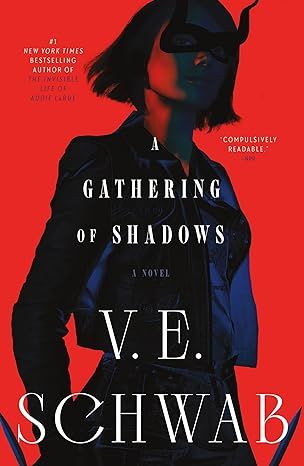
A Gathering of Shadows: A Novel (Shades of Magic, 2)
4.5
-
13,065
$12.31
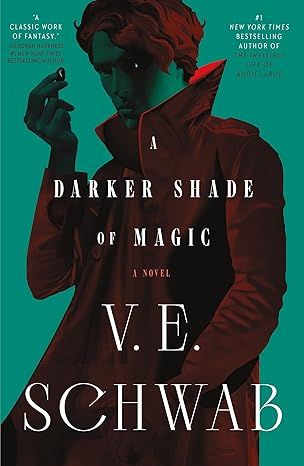
A Darker Shade of Magic: A Novel (Shades of Magic, 1)
4.3
-
21,064
$15.77
Similar Books
Best sellers
View all
The Tuscan Child
4.2
-
100,022
$8.39

The Thursday Murder Club: A Novel (A Thursday Murder Club Mystery)
4.3
-
155,575
$6.33

Sapiens: A Brief History of Humankind
4.6
-
140,302
$13.49

The Butterfly Garden (The Collector, 1)
4.3
-
88,556
$9.59

Things We Hide from the Light (Knockemout Series, 2)
4.4
-
94,890
$11.66

The Last Thing He Told Me: A Novel
4.3
-
154,085
$2.99

The Perfect Marriage: A Completely Gripping Psychological Suspense
4.3
-
143,196
$9.47

The Coworker
4.1
-
80,003
$13.48

First Lie Wins: A Novel (Random House Large Print)
4.3
-
54,062
$14.99

Mile High (Windy City Series Book 1)
4.4
-
59,745
$16.19

Layla
4.2
-
107,613
$8.99

The Locked Door
4.4
-
94,673
$8.53
